July 15, 2024, by Nicholas Blake
The day Mahatma Gandhi came to Beeston
On 17 October 1931 crowds gathered at the small railway station in Beeston, Nottinghamshire. It was a chilly afternoon, but that did not dampen the excited anticipation of the spectators.
When they eventually saw him disembarking from the train, the watchers fell silent, curious. Clad in loincloth and sandals, with a shawl to protect him from the cold, the only part of Mahatma Gandhi visible was his smiling face.
Accompanying him was his faithful follower Madeleine Slade (also known as Mirabehn), along with two detectives from Scotland Yard, some Secret Service men, and his nephew, J.V. Joshi.
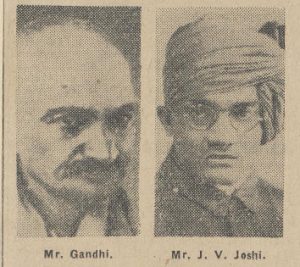
Photographs of Mahatma Gandhi and his nephew, J.V. Joshi, from Nottingham Guardian, 16 October 1931 (UR 1439)
It was his nephew who had invited Gandhi to Beeston. Joshi, a student in Commerce at University College Nottingham, was in regular contact with his uncle, and thought he would like to see the institution where many fellow Indians studied while in England.
After being accosted at Beeston Station by an individual who handed him a Christian pamphlet, the unfazed Gandhi was whisked away in a car to Ericsson’s Telephone Works, where Joshi had been working over the summer break.
More crowds outside Ericsson’s watched as Gandhi arrived for a tour of the works by the manager. Although he appeared to talk animatedly, the stay was brief, and minutes later the entourage retired to Joshi’s student lodgings on Linden Grove, for lunch.
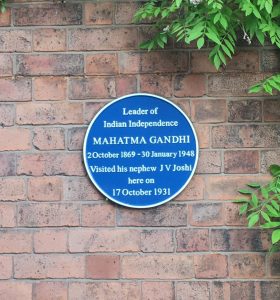
Blue plaque on the house where Mahatma Gandhi visited his nephew on Linden Grove, Beeston. (Photograph by Catherine Martin, 2024.)
Mrs Davies, the owner of the boarding house, specially prepared a meal of bananas, figs, orange juice and goat’s milk, while Gandhi talked with his nephew and several of his Hindu friends from University College.
Under an hour later, Gandhi was on the move again, driven to Highfields to see University College Nottingham. There he was given a tour of the Trent Building by Principal Hugh Stewart (he described the library as “an elegant piece of furniture”) and agreed to talk to students and staff assembled in the Great Hall.
Sat besides Stewart on the stage, Gandhi explained that he was in England primarily to represent the Indian National Congress at the Round Table Conference in London to demand the complete independence of India. Though, as he said, “I have used the term demand. As a matter of fact, no nation has ever secured independence by demanding it. Independence has to be earned by sacrifice and self-suffering”.
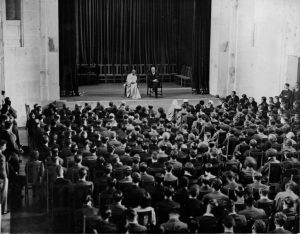
Photograph showing Mahatma Gandhi and Principal Hugh Stewart on stage in the Great Hall, Trent Building, speaking to rows of seated students at Nottingham University College, 17 October 1931. (UMP/2/1/7)
His address lasted around half an hour. Despite at one point suggesting that he might like to stay in Nottingham over the weekend, Gandhi changed his mind, and after leaving the Trent Building he was bundled into yet another car, headed to Birmingham.
Over the years, the Nottingham links with Gandhi were commemorated with two busts. One is on display in Nottingham Council House. Another, sculpted by Sadashiv Dattatray Sathe, was gifted to the University of Nottingham by the High Commissioner for India in 1995.
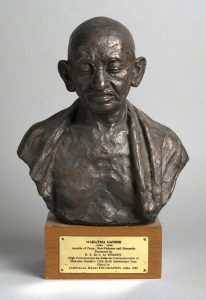
Bust of Mahatma Gandhi by S.D. Sathe given to the University of Nottingham. (Photo © University of Nottingham. Image sourced from Art UK.)
And that is the story of the day – or rather, afternoon – that Mahatma Gandhi visited Beeston.
* * *
Below is reproduced additional material on Gandhi’s visit which we hold at Manuscripts and Special Collections. The originals are available to view in our Reading Room. Please contact us for more information.
Article about the visit published in the University College Nottingham magazine, The gong, Christmas Term 1931, p.28-30 (University of Nottingham Publications Collection, Periodicals Not 5.G14.8.E95):
Newspaper clippings about the visit collected by Principal Hugh Stewart (MS 854/4/3-4):
Pages from a scrapbook of newspaper cuttings relating to University College Nottingham (UR 1439):
No comments yet, fill out a comment to be the first

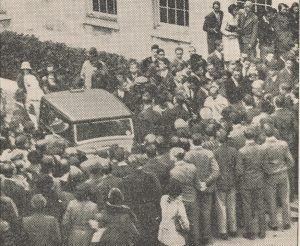
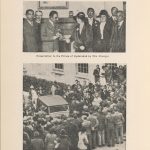
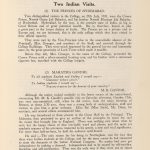
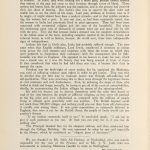
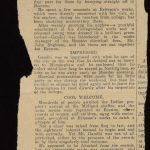
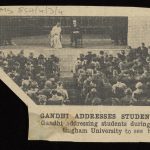
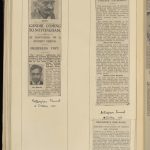
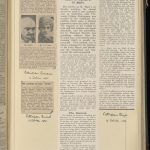
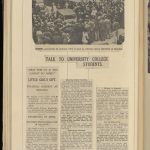
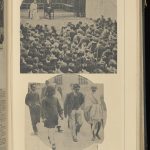
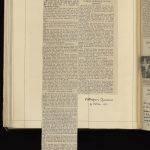
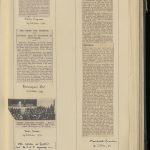
Leave a Reply